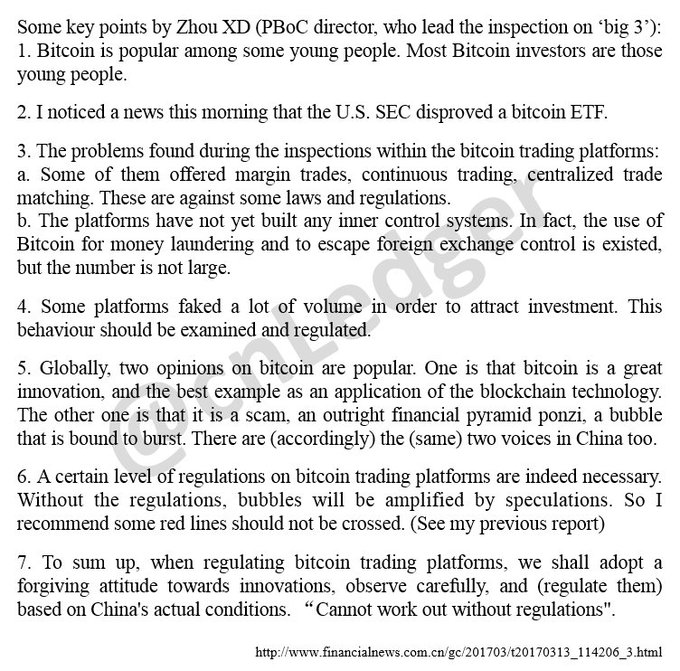The director of the People’s Bank of China (PBoC) has recently shed some light on his views circulating the digital currency Bitcoin after the country’s central bank’s recent regulatory inspections on bitcoin exchanges.
In a translated summary uploaded to Twitter by cnLedger, Zhou Xuedong, stated that ‘most Bitcoin investors are young people’ and that ‘some platforms faked a lot of volume in order to attract investment.’
PBoC Director: Money laundry & capital flight w/ btc aint much; most CN investors are young ppl; forgive innovation,but regulation is a must pic.twitter.com/aRAniWoJGx
After hearing the news of the U.S.’s refusal to approve the first ETF, Xuedong said that the future of Bitcoin in China ‘cannot work without regulations.’
PBoC Interferes with Bitcoin
In January, it was reported that the PBoC had conducted on-site checks on major Chinese bitcoin exchanges in Beijing and Shanghai. These were BTCC, OKCoin and Huobi.
It’s believed that the increased value in the currency was attracting the attention of authorities who were attempting to reduce capital outflows they believed were taking place through the digital currency.
As a result, the price of Bitcoin dropped to around $790 while lesser known Chinese bitcoin miner HaoBTC revealed that it was shutting down its operations after announcing the removal of its exchange service to its users.
In a bid to adhere to the AML and regulatory requirements enforced by the PBoC upon bitcoin exchanges, BTCC announced in February that it was suspending Bitcoin and Litecoin withdrawals. OKCoin and Huobi announced a similar measure too.
All three exchanges were due to resume withdrawals this month, however the suspension continues for all three as they wait for regulatory approval.
PBoC’s View on Bitcoin
With no timeframe insight as to if and when the three Chinese bitcoin exchanges will receive regulatory approval, it appears as though their month-long suspension is to continue indefinitely for the time being.
However, while the PBoC seems set on regulating the currency, it remains to be seen how exactly this will pan out. Earlier this month, it was reported that a central bank official had stated that China should provide clarity toward the currency’s regulation and supervision of bitcoin exchanges.
Not one to take responsibility, though, an official from the Chinese government responded by saying that the supervision of the digital currency exchanges and trading platforms falls under the remit of the PBoC.
With a toing and froing ensuring between both sides it looks as though it may be a few years before any sort of regulation will be seen in China.
How this will impact the currency’s position in the country is not yet known, but it is sure to impact exchanges who currently have their hands tied waiting for regulatory approval.
Featured image from Shutterstock.










No comments:
Post a Comment